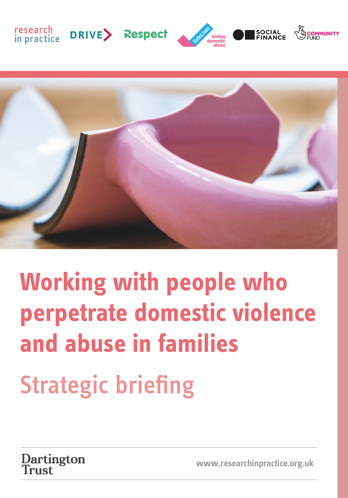Working with people who perpetrate domestic violence and abuse in families: Strategic Briefing (2021)
The Drive Partnership
These resources were recently produced as part of a collaborative project with the DRIVE Partnership and aim to inform our response to perpetrators of domestic abuse within families where children’s social care are involved. The resources, which are also available at the DRIVE Partnership, comprise a rapid literature review, strategic briefing and podcast, and are aimed at multi-sector leaders and practitioners.
Introduction
This briefing discusses work with people who perpetrate domestic violence and / or abuse (DVA), with a specific emphasis on people who perpetrate DVA in families that are involved with children’s social care. When delivered competently and confidently, and in a manner that is victim-survivor focused, perpetrator interventions can contribute to perpetrator behaviour and attitudinal change, increase perpetrator accountability, and reduce the harm posed to adult and child victim-survivors. Work with, and responses to, people who perpetrate DVA spans at least the last three decades and has grown in prominence in recent years. Within the limitations of this short briefing, the aim is to foreground insights from practice, research and lived experience that may be applied to, or inform thinking, in children’s social care work with people who perpetrate DVA.
The briefing does not endorse a particular model of perpetrator intervention, but it does suggest some key principles and messages that could apply to social work with perpetrators of DVA, based on the evidence and established good practice sector guidance. Among these are some messages which are hard to hear, but will be of little surprise to colleagues working in this field. Challenging messages regarding how professional interventions can make victim-survivors feel, for example, are consistently reflected in the available evidence from people with lived experience, practice and academic literature.
However, it is important not to apportion any individual blame, and instead recognise that these messages reflect the extent of the significant challenges facing the children’s social care sector and the need for wider systems and culture change, within this highly complex area of practice. This strategic briefing seeks to explore some ways in which positive change might be achieved, so that policy, practice and strategy planning might be developed in order to improve outcomes for adult and child victim-survivors, as well as to expand the evidence base.
This briefing is published alongside Working with people who perpetrate domestic violence and abuse in families: Evidence Review (2021), and a podcast with representatives from the Drive Partnership, Research in Practice and Dr Olumide Adisa from the University of Suffolk discussing the evidence base in relation to perpetrator interventions.
Professional Standards
PQS:KSS - Relationships and effective direct work | Abuse and neglect of children | Adult mental ill health, substance misuse, domestic abuse, physical ill health and disability | Shaping and influencing the practice system | Designing a system to support effective practice



